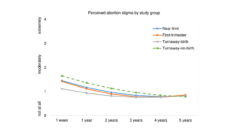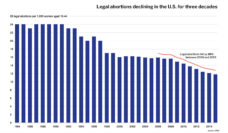When I signed the consent form to sell my eggs through a fertility clinic (16 of them as it turns out), the paperwork clearly laid out all of the short-term risks I was agreeing to take. I had a 0.000004% risk of dying during the egg retrieval, 0.1% risk of internal bleeding, 0.5% risk of infection, and a 2-6% chance of developing pain and swelling in my ovaries as a result of the self-injected hormone treatments.
The consent form claimed there were no known long-term risks. No numbers, no statistics, no list of what those risks might be. I didn’t know it then, but “no known risk” doesn’t mean there are no risks. It means no one knows because no one has bothered to find out.
In vitro fertilization (IVF) using donated oocytes was introduced in the 1980s. Today, thousands of infants are born each year to families previously unable to conceive, and that number is increasing. Researchers have had decades to detect any long-term health risks associated with the hormonal treatment and surgical procedure of egg retrieval. Long-term risks include effects on fertility, chronic disease, or cancers that develop years later as a result of the donation.
Donors undergo similar treatment as IVF patients. Despite this, existing studies on the long-term risks of IVF treatment only include IVF patients, not egg donors. IVF patients are often monitored before, during, and after their treatment, some studies tracking their health for over two decades. Donors are never seen or heard from again after their eggs are collected.
Research on IVF patients cannot be applied to egg donors because they are biologically different. IVF patients are typically over the age of 35 and are often seeking treatment due to infertility. Donors are younger and fertile with little-to-no family history of genetic disease or cancer. They wouldn’t qualify for donation if they didn’t meet these criteria. This biological difference is important. It means that weeks of daily hormone injections are likely to affect a donor differently than a recipient. Similar to taking a medicine for an illness you don’t have, donors injecting an abundance of reproductive hormones that they don’t lack can have effects that won’t appear in studies on IVF patients, who are more likely to have deficiencies in reproductive hormones due to age and infertility. We already know reproductive hormones influence both fertility and risk for numerous types of cancer.
We should protect and value their lives at least as much as the ones they help create.
Egg donors have reported long-term effects including aggressive breast cancer, loss of fertility, and fatal colon cancer, sometimes occurring just a few years after donation. Without any family history of these illnesses, they suspect their egg donation as the cause. However, without scientific research, no one can confirm or deny a causal association between the medical procedure of egg donation and any reported long-term effect.
We need research to know if egg donation is safe for donors long-term. Even if donation is deemed generally safe, research is needed to clarify who donation may or may not be safe for, how many times it is safe for someone to donate, and how much time between donations should be required to remain safe. Researchers and advocates have called for a national donor registry and long-term health monitoring of egg donors, but nothing has yet to materialize.
Why? Because egg donation is lucrative. As infertility rates continue to increase, so does desperation for fertility services and the precious commodity of human eggs. Donors typically receive less than $10,000 for their time and their oocytes, but private fertility clinics profit in the tens of thousands per transaction. It doesn’t make financial sense for a self-regulated billion-dollar industry to invest time and money assuring the long-term safety of donors who are seemingly content with their consent and payment. But it is unethical, especially when considering how donors are recruited and consent is obtained.
Young women are lured through targeted advertisements, promoted on college campuses and through online ads, offering monetary compensation at a financially vulnerable time in their lives when many face years of student loan repayment upon graduation. They are often unaware of health risks when they apply to donate, including the lack of research on long-term risks. When donors accept payment for a physical risk that is not fully understood, it is not informed consent. When clinics do not make it clear to donors that “no known risk” is due to a complete lack of data rather than an absence of risk, it is not just ambiguous, it’s misleading. Combined with the promise of financial payment, the transaction becomes coercive. Bioethics experts argue that the current payment system is likely convincing prospective donors to act against their best interests, and that’s without potential long-term risks taken into account.
The long-term risks of egg donation may be as miniscule as the percentages listed in my consent form for short-term risks. But while there remains considerable uncertainty about the true extent of risk, we should not deceive young egg donors for profit. We should protect and value their lives at least as much as the ones they help create.














